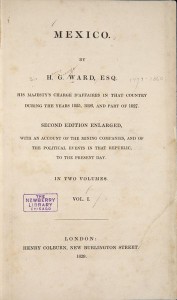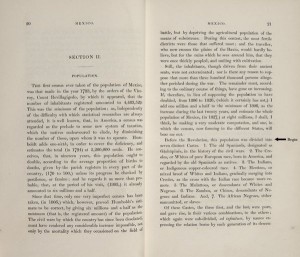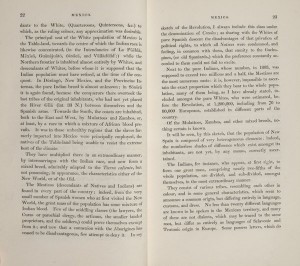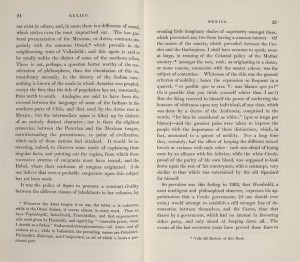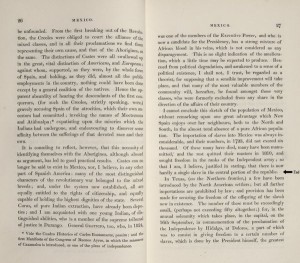http://dcc.newberry.org/collections/caste-and-politics-in-mexican-independence
This section of Ward’s text explicitly discusses, with an inherently British bias, the particularly Mexican casta system and general race relations and social motives. The perspective he contributes to this phenomenon is particularly interesting because he is not himself apart of the system by any account and therefore able to offer a more honest analysis. Ward compares the classification of castes before the Revolution in which he identifies the three pure races and remarks that any combination of the three were “sub-divided, ad infinitum, by names expressing the relation borne by each generation.” The language he writes in expresses doubt and possibly mockery of the system. In explaining race from a geographic perspective, Ward is able to indirectly add to the confusion of his audience. In effect, he is able to inject doubt into the merit of a manufactured classification of coloured people under the premise of: who really knows? His skepticism continues in trying to quantify each group, he admits it is truly “impossible to ascertain… [and that of the mixed breeds]… nothing certain is known” which if accepted would illegitimize the system entirely.
An important aspect of this text and this time-period as a whole is the idea that these groups, with “the great mass of the population [having] some mixture of Indian blood,” are completely unique to the colonized New World. Ward explains how the pure races have “multiplied… in an extraordinary manner; by intermarriages… and now form a mixed breed, admirably adapted to the Tierra caliente, but not possessing in appearance, the characteristics of the New World, or the Old;” not entirely Indigenous, European, or African. He emphasizes that anyone in the middle and certainly the lower classes could scarcely exempt themselves from some Indian heritage. Ward remarks that the extensive establishment of racial distinctions was “the policy of Spain to promote a constant rivalry between the different classes on inhabitant in her colonies” in an effort to prevent unity among a outcast group that would together form a social majority. He continues that race became synonymous with status to the extent that the King of Spain used “whiteness” to be appointed as equivalent to decreeing nobility upon a distinguished individual by remarking “let him be considered white.” Ward himself being white, I find it interesting that he places most of his doubt in the Spanish style of governing and colonialism. The trivialness of these classifications is brought to light during the Revolution when the Creoles, as Ward describes “were obliged to court the alliance of the mixed classes” effectively wiping the intricacies of the Casta system entirely.
